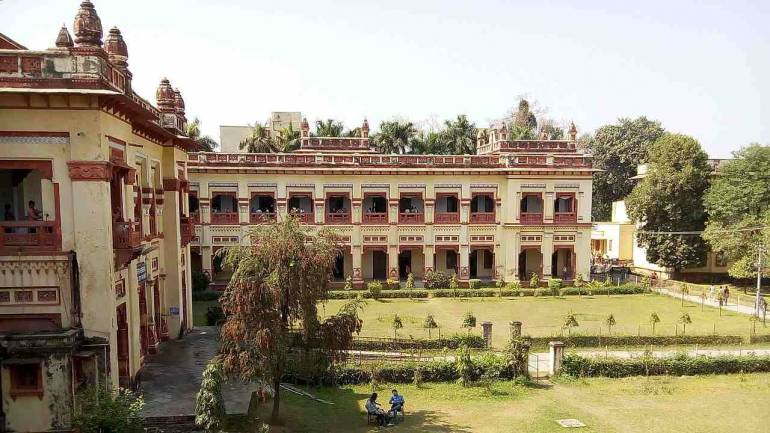Society | BHU and IIT show a malice that runs deep in society
When will people in secular, democratic India embrace pluralism and learn to coexist in a diverse and multicultural country where there is no dearth of space for all?
Moneycontrol Contributor@moneycontrolcom
 Banaras Hindu University, Varanasi, Uttar Pradesh
Banaras Hindu University, Varanasi, Uttar PradeshMA Kalam
What kind of world are we living in where the roles played and activities carried out by individuals, particularly of the less privileged and the minorities, are not being determined by the status / position they hold but by their ethnicity, in terms of their religion / caste?
In one case, an appropriately-qualified person is not deemed fit to teach Sanskrit in a university because he is not a Hindu. In a different context, a girl commits suicide because it is alleged that she was harassed by faculty as she was not considered fit to be part of a class in an institution that has a high brand value. She ‘was facing “all types of harassment” including against her name and religion’.
Having taught at various higher educational institutions in India for over four decades one has been witness to differential and discriminatory practices of upper caste teacher colleagues when it comes to students coming from non-upper caste or other religious backgrounds. Also, one has experienced prejudiced practices, first hand, as a student from a minority religious group in some of the elitist educational institutions in India.
RELATED NEWS
Society | Why IIT-Madras is no longer Tamil Nadu’s pride
During the late 1970s a teacher told a girl student at the University of Madras not to wear salwar-kameez because the outfit was a “Muslim dress”. However, the girl in question was indeed a Muslim! In a different context, salwar-kameez was deemed to be a Pakistani sartorial representation, notwithstanding the fact that salwar-kameez, with or without a dupatta, has been quite the common attire and has been ubiquitous all over north India for years irrespective of caste or religion.
Why do we come across such incidents? Because certain communities have been stereotyped in particular ways as others regarding their whole persona and they are supposed to behave, act, and present themselves in specific ways that have been defined, or may be even ordained, by those they share the physical space with? Should a group’s identity and self-representation not be defined by itself but by another group that deems itself a majority and hence confers upon itself the right to dictate terms to the others?
What is described here is not something that is rare and come across sporadically. On the contrary, even in the so-called secular contexts / spaces this is quite rampant. The reason why this does not come to the fore often is because the tormented individuals / communities, over a period of time, learn to tolerate, absorb and ignore the barbs and inconveniences. If they have to react / respond to each and every sort of discrimination they face, most of their life time would be spent in doing just that — fighting against torments day in and day out.
Why have some taken up the mantle and decided that Firoz Khan should not teach Sanskrit literature at Benares Hindu University (BHU)? The administration made it clear to the agitating students that Khan was selected unanimously on the recommendation of a duly constituted selection committee comprising the vice chancellor and external experts, as per the prescribed UGC regulations and the BHU Act.
The agitators contend that Khan’s appointment has been a conspiracy and the interview process was rigged. They also claim that a stone inscription on the BHU campus bars non-Hindus from studying or teaching in the Sanskrit department. However, the BHU maintains that there is no such stone inscription. Besides, it is pointed out in some circles that Varanasi has had at least two Muslim Sanskrit scholars who have been recipients of Padma awards. One of them, Dr Mohammad Hanif Khan Shastri got the award this year.
No objections were raised in any quarter when a Hindu woman, Gopalika Antharjanam, taught Arabic for 29 years in Kerala. Kerala, it must be remembered, has no shortage of Muslim Arabic teachers. So why pick on Khan?
Pray, what was Fathima Latheef’s fault in having the name that she did, or in belonging to the religion that she did? Is it because very few of her kind make it to IIT Madras that caused consternation to her alleged harassers? Was she subjected to a different sort of treatment because she did not fit into a stereotype that has been lurking in some minds as to the life that someone of her background should lead? Or, was it because by being there she had denied a seat to someone from the majority community or upper caste?
When will people in secular, democratic India embrace pluralism and learn to coexist in a diverse and multicultural country where there is no dearth of space for all?
MA Kalam is Dean — administration and regulatory affairs, and Professor of Anthropology, Krea University, Sri City, Andhra Pradesh. Views are personal.